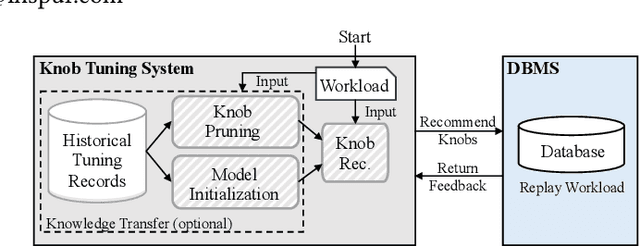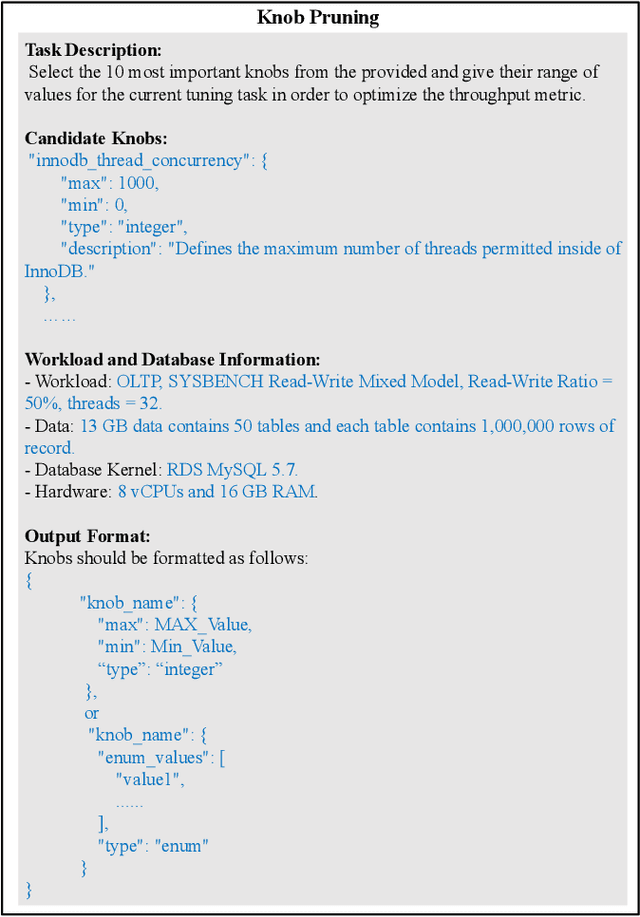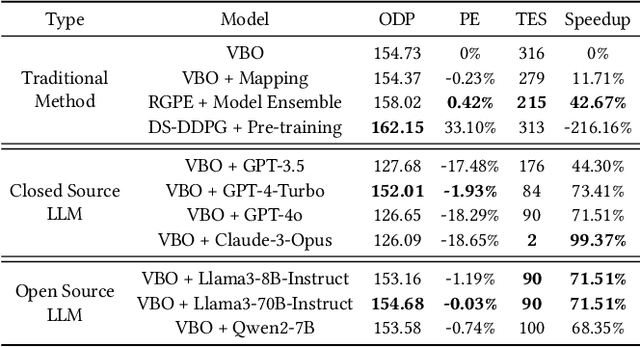Luming Sun
Is Large Language Model Good at Database Knob Tuning? A Comprehensive Experimental Evaluation
Aug 05, 2024



Abstract:Knob tuning plays a crucial role in optimizing databases by adjusting knobs to enhance database performance. However, traditional tuning methods often follow a Try-Collect-Adjust approach, proving inefficient and database-specific. Moreover, these methods are often opaque, making it challenging for DBAs to grasp the underlying decision-making process. The emergence of large language models (LLMs) like GPT-4 and Claude-3 has excelled in complex natural language tasks, yet their potential in database knob tuning remains largely unexplored. This study harnesses LLMs as experienced DBAs for knob-tuning tasks with carefully designed prompts. We identify three key subtasks in the tuning system: knob pruning, model initialization, and knob recommendation, proposing LLM-driven solutions to replace conventional methods for each subtask. We conduct extensive experiments to compare LLM-driven approaches against traditional methods across the subtasks to evaluate LLMs' efficacy in the knob tuning domain. Furthermore, we explore the adaptability of LLM-based solutions in diverse evaluation settings, encompassing new benchmarks, database engines, and hardware environments. Our findings reveal that LLMs not only match or surpass traditional methods but also exhibit notable interpretability by generating responses in a coherent ``chain-of-thought'' manner. We further observe that LLMs exhibit remarkable generalizability through simple adjustments in prompts, eliminating the necessity for additional training or extensive code modifications. Drawing insights from our experimental findings, we identify several opportunities for future research aimed at advancing the utilization of LLMs in the realm of database management.
FOSS: A Self-Learned Doctor for Query Optimizer
Dec 11, 2023



Abstract:Various works have utilized deep reinforcement learning (DRL) to address the query optimization problem in database system. They either learn to construct plans from scratch in a bottom-up manner or guide the plan generation behavior of traditional optimizer using hints. While these methods have achieved some success, they face challenges in either low training efficiency or limited plan search space. To address these challenges, we introduce FOSS, a novel DRL-based framework for query optimization. FOSS initiates optimization from the original plan generated by a traditional optimizer and incrementally refines suboptimal nodes of the plan through a sequence of actions. Additionally, we devise an asymmetric advantage model to evaluate the advantage between two plans. We integrate it with a traditional optimizer to form a simulated environment. Leveraging this simulated environment, FOSS can bootstrap itself to rapidly generate a large amount of high-quality simulated experiences. FOSS then learns and improves its optimization capability from these simulated experiences. We evaluate the performance of FOSS on Join Order Benchmark, TPC-DS, and Stack Overflow. The experimental results demonstrate that FOSS outperforms the state-of-the-art methods in terms of latency performance and optimization time. Compared to PostgreSQL, FOSS achieves savings ranging from 15% to 83% in total latency across different benchmarks.
 Add to Chrome
Add to Chrome Add to Firefox
Add to Firefox Add to Edge
Add to Edge